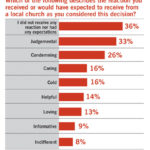Posted: 11/05/04
Right to Life researchers critique abortion study
By Robert Marus
ABP Washington Bureau
WASHINGTON (ABP)–Scholars associated with the National Right to Life committee point to what they consider as flaws in an evangelical seminary professor's study suggesting that the abortion rate has risen during the Bush administration. But the Baptist professor is standing by his conclusion.
Statistician and ethicist Glen Stassen of Fuller Theological Seminary near Los Angeles used statistics from Minnesota Citizens Concerned for Life and the Guttmacher Institute, as well as an analysis of figures on abortion rates in several states, to conclude that abortions likely increased nationwide by several thousand in 2002.
It also noted that, had the trend of a declining abortion rate–which decreased more than 17 percent between 1990 and 2000–continued under Bush's administration, about 50,000 fewer abortions would have taken place in 2002 than did.
In addition, Stassen tied the increase in abortion rate to economic factors, noting that such jumps in the number of abortions have historically occurred when unemployment was high. Pregnant women are less likely to abort their children if they or the fathers of their children have stable jobs and health-care coverage.
But two researchers for a group that opposes abortion rights and supports Bush's position said Stassen's argument was off the mark. Randall O'Bannon and Laura Hussey of the National Right to Life Educational Trust Fund wrote that “neither his data nor his argument hold up under scrutiny.”
One of their critiques was that Stassen's sample size wasn't large enough.
“Since no national abortion data have been reported since 2000, Stassen looks at abortion figures for 16 states over 2001, 2002, and in some cases, 2003,” O'Bannon and Hussey wrote. “Stassen confidently claims that abortions increased in 11 of those 16 states during the Bush administration and asserts that this reflects a larger national upward trend in abortions. Yet Stassen never demonstrates that his 16 states are representative of the 50 states.”
Stassen defended the sample size by pointing to statistics cited every day in the run-up to the presidential election.
“The political polls include 500 or 1,000 respondents and extrapolate to 50 million voters. I have 16 states out of 50, which is a much greater sample, proportionately,” he said.
O'Bannon and Hussey also noted Stassen had incorrectly cited increases in the 2002 abortion rate in two states–South Dakota and Wisconsin–that actually showed decreases in their abortion rates. They also said newer statistics on the abortion rate in Illinois showed a significant decrease in 2003.
Therefore, O'Bannon and Hussey said: “When one shifts Wisconsin and South Dakota to the decrease column, and adds in Illinois after its dramatic 2003 drop in abortions, Stassen's claim that abortions have increased in 11 out of 16 states now turns into an eight-to-eight tie, with as many states decreasing as increasing. Hardly anything definitive.”
Stassen acknowledged the mistake with the Wisconsin and South Dakota figures but said he did not use the Illinois figures because they were too recent and may be incomplete. He also said the anti-abortion researchers were engaging in the same crime of which they accuse him.
“O'Bannon and Hussey confirm my report that Illinois abortions increased in 2002, but then they report that they found data for Illinois in 2003, in which the number of abortions then decreased,” he wrote. “Yet when they point to Wisconsin's 2002 decrease, they fail to report that in 2003, abortions in Wisconsin actually increased. Such selectivity looks like trying to defend against the truth and support a preconceived notion rather than accepting all the data in a consistent way.”
O'Bannon and Hussey also criticized Stassen's economic argument, contending that his data was insufficient to tie the abortion rate to unemployment figures. They also noted abortion rates and statewide unemployment rates in some of the states Stassen cited in his study don't correlate the way he claims they do nationally.
“Illinois' abortions dropped substantially between 2002 and 2003, in spite of its unemployment rate being stuck at 6.7 percent, among the worst in the nation,” they wrote. “Ohio's unemployment rate rose considerably relative to most other states, but abortions there declined. If the economic determinism Stassen assumes was valid, those state results would be reversed.”
But Stassen said studying the nationwide analysis over the past 30 years of abortion rates and unemployment rates confirms his assertions. He also cited other statistics–such as the fact that African-American and Hispanic women experience higher rates of unemployment and higher abortion rates than do white women.
O'Bannon and Hussey also accused Stassen of being dishonest by presenting himself as “consistently pro-life” in the original op-ed piece.
“Stassen presents himself as someone sympathetic to the pro-life cause who was shocked and saddened to find out that our pro-life president's policies were not having the pro-life effects he anticipated,” they said. “But this persona that he adopts is somewhat misleading as well.”
In 1977, they noted, Stassen was one of several Christian professors who signed “A Call to Concern,” a document that they say “expressed support for the Roe vs. Wade decision and affirmed that 'abortion in some instances may be the most loving act possible.'”
Stassen said the 1977 statement did not, in fact, support the controversial 1973 Supreme Court decision legalizing abortion.
“I signed a statement supporting academic freedom for Christian ethicists and moral theologians who take varieties of positions on these issues, and who were under pressure in some schools,” he said. “I do not appreciate the personal attack.”













We seek to connect God’s story and God’s people around the world. To learn more about God’s story, click here.
Send comments and feedback to Eric Black, our editor. For comments to be published, please specify “letter to the editor.” Maximum length for publication is 300 words.